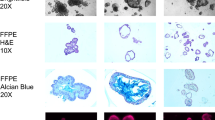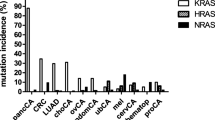Abstract
Colorectal cancer (CRC) corresponds to the third most prevalent type of cancer. Its origins can either be sporadic or inherited, being Lynch syndrome the most common form of hereditary CRC. The activation of BRAF oncogene, inactivation of mismatch repair genes by methylation of CpG islands, and microsatellite instability (MSI) have been reported to be involved in CRC development. The goal of the study was to characterize CRC tumors using clinical and molecular criteria through association and cluster analysis. Amsterdam II and Bethesda guidelines and molecular variables were analyzed in 77 patients from Brazil. The replication error (RER) status, based in microsatellite instability, showed association with metachronous tumor, MLH1 gene methylation and inverse association with left-sided and synchronous tumors. The PMS2 gene was considered the best predictor for differentiating levels of methylation and the mononucleotide were considered the best markers to evaluate RER status. The cluster 1 was characterized of individuals over 60 years of age, female, right-sided tumor, high microsatellite instability, and metachronous or synchronous tumors. The individuals in cluster 2 were younger than 45 years of age, male and showed left sided or rectum tumors, and microsatellite stability. Even though it was not observed a significant association, a higher number of individuals with family history of cancer and tumors without promoter methylation were found in cluster 2. The V600E mutation did not show association with clinical or molecular characteristics. Evaluation of MSI and methylation of MLH1 and PMS2 genes should be considered in order to assist with clinical diagnosis.
Similar content being viewed by others
References
Ioana M, Angelescu C, Burada F et al (2010) MMR gene expression pattern in sporadic colorectal cancer. J Gastrointestin Liver Dis 19:155–159
Thodi G, Fostira F, Sandaltzopoulos R et al (2010) Screening of the DNA mismatch repair genes MLH1, MSH2 and MSH6 in a Greek cohort of Lynch syndrome suspected families. BMC Cancer 10:544
Morán A, Ortega P, de Juan C et al (2010) Differential colorectal carcinogenesis: molecular basis and clinical relevance. World J Gastrointest Oncol 2:151–158
Ebert MP, Model F, Mooney S et al (2006) Aristaless-like homeobox-4 gene methylation is a potential marker for colorectal adenocarcinomas. Gastroenterology 131:1418–1430
de la Chapelle Al (2004) Genetic predisposition to colorectal cancer. Nature 4:769–780
Benson AB III, Ajani JA, Catalano RB et al (2004) Recommended guidelines for the treatment of cancer treatment-induced diarrhea. J Clin Oncol 22:2918–2926
Tanaka H, Deng G, Matsuzaki K et al (2006) BRAF mutation, CpG island methylator phenotype and microsatellite instability occur more frequently and concordantly in mucinous than non-mucinous colorectal cancer. Int J Cancer 118:2765–2771
Lynch HT, Smyrk T, Jass JR (1995) Hereditary nonpolyposis colorectal cancer and colonic adenomas: aggressive adenomas? Semin Surg Oncol 11:406–410
Lynch HT, Lynch JF (1998) Genetics of colonic cancer. Digestion 59:481–492
Al-Sukhni W, Aronson M, Gallinger S (2008) Hereditary colorectal cancer syndromes: familial adenomatous polyposis and Lynch syndrome. Surg Clin N Am 88:819–844
Imai K, Yamamoto H (2008) Carcinogenesis and microsatellite instability: the interrelationship between genetics and epigenetics. Carcinogenesis 29:673–680
Leite SMO, Gomes KG, Pardini VC et al (2010) Assessment of microsatellite instability in colorectal cancer patients from Brazil. Mol Biol Rep 37:375–380
Loughrey MB, Waring PM, Tan A et al (2007) Incorporation of somatic BRAF mutation testing into an algorithm for the investigation of hereditary non-polyposis colorectal cancer. Fam Cancer 6:301–310
Pichler M, Balic M, Stadelmeyer E et al (2009) Evaluation of high-resolution melting analysis as a diagnostic tool to detect the BRAF V600E mutation in colorectal tumors. J Mol Diagn 11(2):140–147
Jarry A, Masson D, Cassagnau E et al (2004) Real-time allele-specific amplification for sensitive detection of the BRAF mutation V600E. Mol Cell Probes 18:349–352
Benlloch S, Payá A, Alenda C et al (2006) Detection of BRAF V600E mutation in colorectal cancer: comparison of automatic sequencing and real-time chemistry methodology. J Mol Diagn 8:540–543
Deng G, Bell I, Crawley S et al (2004) BRAF mutation is frequently present in sporadic colorectal cancer with methylated hMLH1, but not in hereditary nonpolyposis colorectal cancer. Clin Cancer Res 10:191–195
Ueda M, Toji E, Nunobiki O et al (2008) Mutational analysis of the BRAF gene in human tumor cells. Hum Cell 21:13–17
Mao C, Liao RY, Qiu LX et al (2011) BRAF V600E mutation and resistance to anti-EGFR monoclonal antibodies in patients with metastatic colorectal cancer: a meta-analysis. Mol Biol Rep 38:2219–2223
Deng G, Chen A, Hong J et al (1999) Methylation of CpG in a small region of the hMLH1 promoter invariably correlates with the absence of gene expression. Cancer Res 59:2029–2033
Ogino S, Nosho K, Kirkner GJ et al (2009) CpG island methylator phenotype, microsatellite instability, BRAF mutation and clinical outcome in colon cancer. Gut 58:90–96
Tanaka N, Huttenhower C, Nosho K et al (2010) Novel application of structural equation modeling to correlation structure analysis of CpG island methylation in colorectal cancer. Am J Pathol 177:2731–2740
Velho S, Moutinho C, Cirnes L et al (2008) BRAF, KRAS and PIK3CA mutations in colorectal serrated polyps and cancer: primary or secondary genetic events in colorectal carcinogenesis? BMC Cancer 8:255
Ionov Y, Peinado MA, Malkhosyan S et al (1993) Ubiquitous somatic mutations in simple repeated sequences reveal a new mechanism for colonic carcinogenesis. Nature 363:558–561
Thibodeau SN, Bren G, Schaid D et al (1993) Microsatellite instability in cancer of the proximal colon. Science 260:816–819
Papadopoulos N, Nicolaides NC, Wei YF et al (1994) Mutation of a mutL homolog in hereditary colon cancer. Science 263:1625–1629
Wheeler JM, Bodmer WF, Mortensen NJ (2000) DNA mismatch repair genes and colorectal cancer. Gut 47:148–153
Lorente A, Mueller W, Urdangarin E et al (2008) Detection of methylation in promoter sequences by melting curve analysis-based semiquantitative real time PCR. BMC Cancer 8:61
Fearon ER, Vogelstein B (1990) A genetic model for colorectal tumorigenesis. Cell 61:759–767
Huang YQ, Yuan Y, Ge WT et al (2010) Comparative features of colorectal and gastric cancers with microsatellite instability in Chinese patients. J Zhejiang Univ Sci B 11:647–653
Chung DC, Rustgi AK (2003) The hereditary nonpolyposis colorectal cancer syndrome: genetics and clinical implications. Ann Intern Med 138:560–570
Umar A, Boland CR, Teriman JP et al (2004) Revised Bethesda guidelines for hereditary nonpolyposis colorectal cancer (Lynch syndrome) and microsatellite instability. J Natl Cancer Inst 96:261–268
Mullis KB, Faloona FA (1987) Specific synthesis of DNA in citro a polymerase-catalyzed chain reaction. Methods Enzymol 155:335–350
Saiki RK, Gelfand DH, Stoffel S et al (1988) Primer-directed enzymatic amplification of DNA with a thermostable DNA polymerase. Science 239:487–491
Koehler-Santos P, Izetti P, Abud J et al (2011) Identification of patients at-risk for Lynch syndrome in a hospital-based colorectal surgery clinic. World J Gastroenterol 17:766–773
Benatti P, Gafá R, Barana D et al (2005) Microsatellite instability and colorectal cancer prognosis. Clin Cancer Res 11:8332–8340
Douillard JY (2010) Microsatellite instability and mismatch repair genes in colorectal cancer: useful tools for managing patients and counseling their relatives. Clin Colorectal Cancer 9:193–194
Nosho K, Irahara N, Shima K et al (2008) Comprehensive biostatistical analysis of CpG island methylator phenotype in colorectal cancer using a large population-based sample. PLoS One 3(11):e3698
Li L, McVety S, Younan R et al (2006) Distinct patterns of germ-line deletions in MLH1 and MSH2: the implication of Alu repetitive element in the genetic etiology of Lynch syndrome (HNPCC). Hum Mutat 27:388
Rossi BM, Lopes A, Ferreira FO et al (2002) hMLH1 and hMSH2 gene mutation in Brazilian families with suspected hereditary nonpolyposis colorectal cancer. Ann Surg Oncol 9:555–561
Da Silva FC, Valentin MD, de O Ferreira F et al (2009) Mismatch repair genes in Lynch syndrome: a review. Sao Paulo Med J 127(1):46–51
Van Roon EHJ, van Puijenbroek M, Middeldorp A et al (2010) Early onset MSI-H colon cancer with MLH1 promoter methylation, is there a genetic predisposition? BMC Cancer 10:180
Farinha-Sarasqueta A, Van Lijnschoten G, Moerland E et al. (2010) The BRAF V600E mutation is an independent prognostic factor for survival in stage II and stage III colon cancer patients. Ann Oncol. doi: 10.1093/annonc/mdq258
Herreros-Villanueva M, Rodrigo M, Claver M et al (2011) KRAS, BRAF, EGFR and HER2 gene status in a Spanish population of colorectal cancer. Mol Biol Rep 38:1315–1320
Calvert PM, Frucht H (2002) The genetics of colorectal cancer. Ann Intern Med 137:603–612
Acknowledgment
We acknowledge Frederico Scott Malta, Michele Gonçalves e Valda Ribeiro for technical support.
Author information
Authors and Affiliations
Corresponding author
Electronic supplementary material
Below is the link to the electronic supplementary material.
Rights and permissions
About this article
Cite this article
Rasuck, C.G., Leite, S.M.O., Komatsuzaki, F. et al. Association between methylation in mismatch repair genes, V600E BRAF mutation and microsatellite instability in colorectal cancer patients. Mol Biol Rep 39, 2553–2560 (2012). https://doi.org/10.1007/s11033-011-1007-8
Received:
Accepted:
Published:
Issue Date:
DOI: https://doi.org/10.1007/s11033-011-1007-8




